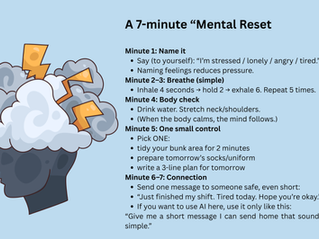Mental Health Awareness Day 2018
- Penelope Robotis Psychologist Psychotherapist
- Oct 11, 2018
- 3 min read
Updated: May 31, 2021
October 10 – World Mental Health Day

One in four people will experience a mental-health “problem” at some point in their life according to the “Economist”. In higher-developed countries, mental illnesses account for more day to day suffering and pre-mature deaths than heart disease, strokes, or cancer. According to studies, half of all mental illnesses begin by the age of 14, however most of these cases go undetected and untreated due to lack of awareness.
The most common mental health disorder is depression, affecting more than 300 million people worldwide, followed by anxiety disorders affecting about 260 million . It has been reported that overall depression and anxiety cost the global economy one trillion in lost productivity. According to epidemiological studies an increased rate for other major disorders, including bipolar and schizophrenia and dementia has been reported the past decade Dementia currently affects 50 million people and is projected to affect 75 million people worldwide by the year 2030. Unequivocally, mental-health disorders are the major drivers for non-fatal health loss and top 10 causes of Years Lived with Disability and appear to be on the increase. (WHO,2017)
Despite the increasing lifetime prevalence rates of mental health disorders and the associated health and financial losses, only 41% of adults and less than 50% of children seek or receive mental health services . Furthermore, people working in high-risk occupations and stressful working environments have a higher chance of developing a mental-health related disorders than the general population.
Prevention should start with a better understanding of the early warning signs and symptoms of mental health disorders, and the implementation of well being and resilience programs to protect people against the risk for developing a mental health problems . As reported in the literature, the application of well-being and resilience programs in schools and work environments, have demonstrated their effectiveness in preventing the onset of a number of health problems including stress and anxiety . Building mental resilience is the first step to acknowledging and preventing mental-health associated disorders, and there are a few ways to do so.
5 Steps to build a better mental health:
Keep a positive attitude – Although it may sound simple, a positive attitude may sometimes be key to deflecting stressors. One way to do so, is by stopping pessimistic thoughts in their tracks, ask yourself “is there a rational basis to feeling negative about this situation”? Recognize that you are in control. When encountering difficult and stressful situations stay calm, focus and reframe the problem. Focus on alternative ways of dealing with the situation and explore the possible consequences of all possible solutions to the problem or situation.
Find a resilient role model – Imitation is powerful, role models are very important to our lives and they may influence us in the way they respond in times of stress. If you can not recall a role model, think of a personal difficult situation you were able to deal with effectively and think of your strong points that helped you overcome the difficult situation. It could be your faith, your knowledge, your patience , your family, etc.
Train your brain – Hard, but not impossible. With self-discipline and rigorous training, you can do it, through building emotional intelligence and physical endurance it helps deflecting stressors. But do not forget to rest your brain, adequate sleep is central to all aspects of a healthy brain.
Exercise on your well-being – Regular and proper exercise is often considered as one of the keys to cleansing your mind off stress. Although when mounted with stress and anxiety it may seem difficult to exercise, you should try to think of it as a welcoming activity rather than just another task.
Eat a brain-healthy diet – An un-healthy diet can take a toll on your mood, your energy and your immune system. On the other hand, switching to a “Brain-Healthy” diet will boost your energy, sleep and of course your mental health.
Constructive Thinking _ Avoid dwelling or overanalyzing the problem, blaming , or one sided thinking. Be proactive and actively engage in problem solving , explore alternative solutions and making needed changes.
Engaging in positive behaviors and being proactive protects you against all health risks. Sharing is Caring so kindly spread the message.
We appreciate your participation to our mental health awareness project.





































































































Comments